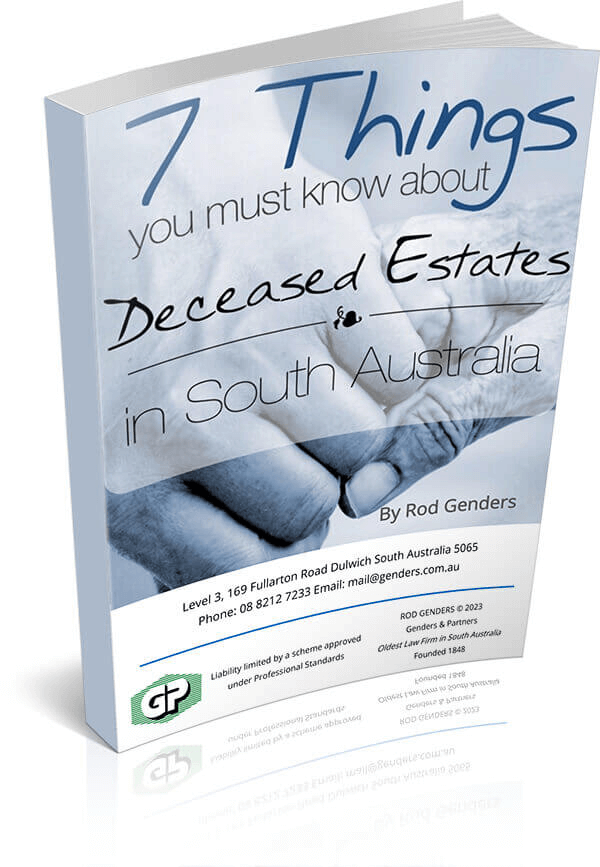
An Executor is the person appointed in the Will of a deceased person with the lawful authority to administer the deceased estate.
An Executor has a special responsibility – known as fiduciary duty – to hold the estate in trust for the beneficiaries, and to act in the best interests of the estate.
Here are 7 things every Executor should do:
1.Consult a Senior Lawyer who Specialises in Deceased Estates
Unless the Will contains a specific direction, it’s up to the Executor to decide which lawyer to retain, but here’s a tip to keep in mind: A specialist lawyer will be faster and better for the estate and provide better protection for the Executor. Executors are performing a legal function, and there are hidden risks which can come back to bite the unwary Executor.
This is an example of where a little knowledge can be a dangerous thing. Probate and Deceased Estate administration is a specialised area of law. Don’t be fooled into believing the lady at the hairdresser or the bloke down the pub who says that it is easy to do this yourself, or that the lawyer who handled your divorce, or your uncle’s drink-driving offence, can easily do this. If you pay peanuts, you’re very likely to get monkeys.
The lawyer will advise the Executor on matters that require immediate attention including the applicability of limitation periods, notifying beneficiaries, the disposition of assets and provisions for the needs of any dependents. Without the assistance of a lawyer, it’s easy to get in over your head and even end up facing personal liability for a mistake.
Administering an estate is no easy feat. The duties and responsibilities of the Executor are significant, and the apparent size and complexity of the estate are not the only factors to take into account. Prudence and due diligence are required when administering any deceased estate, as Executors can be held personally liable for certain mistakes.
Did you know that there are FIVE different types of deceased estate administration in Australia?
Or that Probate is not always required in every estate?
Succession law is a specialised area of law. Don’t gamble on the quality of legal advice you rely upon.
2.Identify and Secure the Estate Assets
The Executor is responsible for locating, securing and protecting the assets of the estate.
Before Probate is granted by the Court, the Executor is in ‘caretaker’ mode – acting as a custodian of the estate assets until the Court grants the authority to move to the next phase of the administration. The Executor has a duty to safeguard the assets and prevent them from wasting.
It is necessary for the Executor to create and publically disclose a list of all the assets and liabilities of the estate as an integral part of the application for a grant of probate.
Did you know that some Australian states (including South Australia) still maintain criminal penalties for Executors who fail or refuse to accurately disclose ALL estate assets?
Compiling an accurate list of estate assets & liabilities requires that Executors determine whether the deceased controlled assets (s)he did not own outright, as these types of assets might not be probateable assets:
- assets jointly owned with another individual – such as real estate or any joint bank accounts with spouses or children.
- superannuation or insurance policies with valid beneficiary designations.
- assets on trust for others.
Of course, when compiling the list of assets, the Executor will need to ascertain if the deceased owned any jewellery, real estate, vehicles, investments, bank accounts etc that would form part of the Estate.
An Executor is responsible for locating, protecting and securing all estate assets pending their final sale or distribution. If the deceased owned property that is vacant, the Executor must ensure that the property is locked and secure. Insurances should be checked and maintained. Inquiries should be made at banks where the deceased held accounts. This should be done immediately after the death of the deceased.
Executors who fail to properly locate and protect all estate assets may find themselves personally liable to beneficiaries for any resulting loss in value or damage or other claims arising from negligent behaviour.
3.Get Familiar with the Scope of Their Duties
While it may be considered an honour to be appointed as an Executor, it is not a role to be taken on lightly without thorough knowledge of the legal risks involved. Estate litigation is expensive and can last for years. When money is on the line, beneficiaries can and often do sue the Executor for their mistakes or what they perceive as undue delay. In most cases, a personally appointed Executor cannot charge for their services, unless the Court orders it or the Will expressly authorises this. This does not apply to professional Executors and Trustees.
An Executor is always allowed (and is encouraged) to take professional advice to assist with the administration of the estate. It is false economy to try to DIY this. Even if you are confident that all the beneficiaries and family members are currently on good terms, who knows what the future holds? If one of them were to die unexpectedly, then someone suing through their estate might suddenly take exception to something you did while administering this estate. People in grief and stress can behave irrationally. Make sure you know what risk you are really taking – for yourself and your family – now and into the future.
4.Keep Proper Records
Executors who have accepted the responsibility of administering an estate must provide an accounting of the assets of the estate to the Court and thus to the world. This accounting of estate assets provides details to the beneficiaries as to how the estate finances were handled, how money was spent, why it was spent, and what the remaining assets of the estate are. Doing this yourself is onerous. Some people don’t keep accurate records, and get into personal trouble as a result.
Courts require Executors to provide regular accounting to the beneficiaries upon request. This means keeping comprehensive records of income and distributions. A great deal of care is required in preparing and keeping proper records as faulty records can be the subject of a lawsuit later by beneficiaries (or someone suing through them, including trustees-in-bankruptcy). To avoid personal liability, an estate Executor should stay organised from the start, and ideally should have the protection of having a good lawyer acting for them.
5.Identify any Liabilities and Pay Taxes
The Executor can incur personal liability during the administration of the estate. Typically this occurs when the Executor distributes assets of the estate to the beneficiaries without making adequate provision for the payment of all estate debts. This is especially significant where taxes are concerned.
Executors are required to file taxes with respect to the estate, including any returns before the death of the deceased in which the deceased did not file a return, and a return for the year of death. Sometimes the estate tax returns can take many months to finalise and be accepted by the ATO. If an Executor has distributed all the estate funds before the final estate liabilities are known, they may become personally liable to make good the difference.
6.Don’t Rush to Open an Estate Bank Account
Estate trustees are sometimes encouraged to open a separate estate bank account after the deceased dies. This is often ‘sold’ to the Executor by the Deceased’s bank when they start making enquiries about the deceased’s assets. The bank will say that the new account is needed to deposit the deceased’s money, and will be available to pay the deceased’s debts and bills and to ultimately distribute the remaining funds to the beneficiaries of the estate. HOWEVER, the bank might not tell you that:
- If you employ a lawyer to assist you in the administration of the deceased estate, then the lawyer’s Trust Account will be available to you for free as part of the process – meaning that a new bank account is not necessary or even useful.
- Every new bank account requires a new Tax File Number to be applied-for to be linked to that account.
- Bank accounts carry fees & charges, and the bank employee who recommended it probably has a quota of new accounts to open, and receives a commission for signing you up.
- If you open the new account, it will have to be in the name of “the estate of …” and this is a separate legal entity to the deceased themselves. With only a few specific exceptions, you won’t be able to withdraw anything from this new account until after you receive probate – which might be months away.
- The old bank accounts will be effectively ‘frozen’ for withdrawals for most things at the deceased’s date of death, and you won’t be able to transfer between the accounts until after probate.
7.Don’t be pressured to distribute the funds too soon
This is a very common mistake made by many Executors. They should not distribute funds from the estate until all potential claims against the estate Executor are extinguished, otherwise the Executor can be held personally liable for any funds that were prematurely distributed.
If you are named as Executor of a Will or know someone who is, we offer a cost effective and convenient estate administration service. Our specialist expert consultants can come to you and our rates are very competitive. To learn more about our services please call (08) 8212 7233 or email mail@genders.com.au
FREE REPORT “7 Things You Must Know About Probate and Estate Administration”

In this report you will Learn:
- What is Probate
- Duties of Executors
- Who Should Serve as Executor
- Executor’s Commissions
- Legal Fees and Expenses
- Sale of Real Estate and Other Property
- Challenges to the Will or Estate







